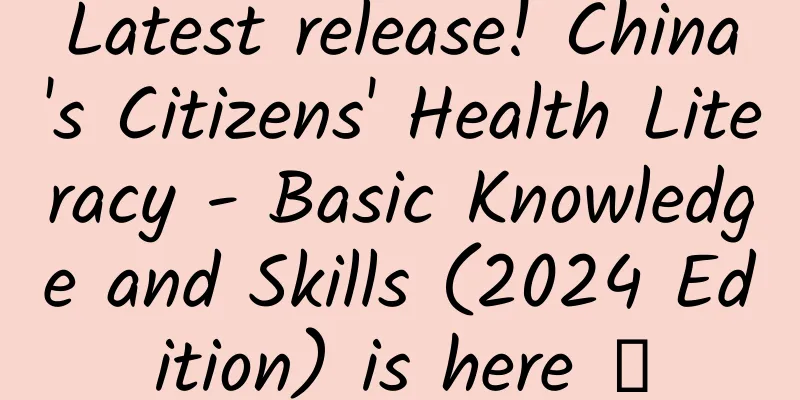Latest release! China's Citizens' Health Literacy - Basic Knowledge and Skills (2024 Edition) is here →

|
May 30 The National Health Commission’s official website released China's Citizens' Health Literacy Basic Knowledge and Skills (2024 Edition) The full text is as follows ↓↓↓ Chinese citizens' health literacy: basic knowledge and skills (2024 edition) 1. Basic knowledge and concepts 1. Health is not merely the absence of disease or infirmity, but a state of physical, mental and social well-being. Prevention is the most effective and economical means of promoting health. 2. The physical and mental health of citizens is protected by law, and everyone has the responsibility to maintain their own health and not harm the health of others. 3. Actively learn health knowledge, practice a civilized and healthy lifestyle, and maintain and promote your own health. 4. The environment and health are closely related. Protecting the environment promotes health. 5. Donate blood for free to help others and benefit yourself. 6. Everyone should care for, help and not discriminate against the sick and disabled. 7. Have regular health check-ups. 8. Blood pressure, body temperature, respiration and heart rate are the four major vital signs of the human body. 9. The source of infection, transmission route and susceptible population are the three links in the spread of infectious diseases. Everyone is responsible for preventing and controlling infectious diseases. 10. Children should be vaccinated according to the immunization schedule after birth, and adults can also prevent diseases through vaccination. 11. AIDS, hepatitis B and hepatitis C are transmitted through three ways: blood, sexual contact and mother-to-child. They cannot be transmitted through daily life and work contact. 12. If you have cough and sputum for more than 2 weeks, or blood in the sputum, you should promptly check whether you have tuberculosis; if you adhere to standardized treatment, most tuberculosis patients can be cured. 13. Domestic dogs and cats should be vaccinated with veterinary rabies vaccines. If a person is scratched or bitten by a dog or cat, the wound should be rinsed and disinfected immediately, and rabies immunoglobulin (or serum or monoclonal antibody) and human rabies vaccine should be injected as soon as possible. 14. Mosquitoes, flies, rats, cockroaches, etc. can spread many diseases. 15. Do not process or eat dead poultry or livestock. Do not hunt, buy, sell, touch or eat wild animals. 16. Pay attention to changes in blood pressure, control risk factors for hypertension, and patients with hypertension should manage their own health well. 17. Pay attention to blood sugar changes, control diabetes risk factors, and diabetic patients should manage their own health well. 18. Pay attention to lung function, control COPD risk factors, and COPD patients should manage their own health. 19. Actively participate in cancer screening to detect cancer and precancerous lesions early. 20. Prevent osteoporosis and promote bone health. 21. Care for the elderly, prevent them from falling, and identify senile dementia. 22. Care for the reproductive health of adolescents and women, choose safe and appropriate contraceptive measures, prevent and reduce unwanted pregnancies, and protect fertility. 23. Workers have the right to occupational health protection in accordance with the law; workers should understand the hazardous factors in their jobs and working environment (such as dust, noise, toxic and harmful gases, etc.), abide by operating procedures, take personal protection measures, and avoid occupational health damage. 24. Health foods are not medicines. Choose health foods correctly. 2. Healthy Lifestyle and Behavior 25. Weight is related to many diseases. You should balance your diet and exercise, maintain a healthy weight, and avoid being overweight or obese. 26. The diet should be mainly based on cereals, eat more vegetables, fruits and potatoes, pay attention to the combination of meat and vegetables, coarse and fine foods, and do not be partial or picky about food. 27. The diet should be light, with less salt, oil and sugar, and qualified iodized salt should be consumed. 28. It is recommended to consume dairy products, soy beans and their products every day, and eat nuts in moderation. 29. Raw and cooked foods should be stored and processed separately. Raw vegetables and fruits should be washed thoroughly. Do not eat spoiled or expired food. 30. Cherish food and do not waste it. Promote the use of public chopsticks and separate meals and maintain hygiene. 31. Pay attention to drinking water hygiene, drink enough water every day, and do not drink or drink less sugary drinks. 32. Scientific fitness requires persistence. Healthy adults should perform 150 to 300 minutes of moderate-intensity or 75 to 150 minutes of high-intensity aerobic exercise per week, and should perform resistance training 2 to 3 times per week. 33. Do not smoke (including e-cigarettes). Smoking and exposure to secondhand smoke can lead to a variety of diseases. E-cigarettes contain a variety of harmful substances that can harm your health. 34. Tobacco dependence is a chronic addictive disease. The sooner you quit smoking, the better. You can benefit from quitting smoking at any age. You can seek professional smoking cessation services when quitting smoking. 35. Drink less and don’t drink excessively. 36. Pay attention to and maintain mental health, and actively seek help when encountering psychological problems. 37. Everyone may experience anxiety and depression. We should have a correct understanding of anxiety and depression. 38. Promote children’s early development through parent-child communication and play. Seek medical attention promptly if any psychological or behavioral development problems are found. 39. Combine work and rest, maintain a regular daily routine, and ensure adequate sleep. 40. Pay attention to personal hygiene, develop good hygiene habits, use disinfection products scientifically, and actively prevent infectious diseases. 41. Protect oral health, brush your teeth in the morning and evening, and rinse your mouth after meals. 42. Seek medical treatment scientifically, seek medical treatment in a timely manner, follow the doctor's instructions for treatment, and treat the diagnosis and treatment results rationally. 43. Use medication rationally, take it orally instead of intramuscularly if possible, or intramuscularly instead of infusion if possible, and use antimicrobial drugs as prescribed by the doctor. 44. Use addictive drugs such as narcotics and psychotropic drugs as prescribed by your doctor to prevent drug dependence. 45. Say no to drugs. 46. Use sanitary toilets in rural areas and manage poultry and livestock manure properly. 47. Wear a helmet and fasten your seat belt; do not speed, drink and drive, drive distracted, or drive while tired; children should use safety seats to reduce road traffic injuries. 48. Strengthen care and education, prevent children from drowning, and rescue drowning people scientifically. 49. When heating in winter, pay attention to ventilation to prevent carbon monoxide poisoning. 50. Actively receive pre-marital and pre-pregnancy health care, give birth at the appropriate age, follow the doctor's instructions to receive prenatal examinations and pregnancy risk screening assessments during pregnancy, and give birth in a hospital. 51. Breastfeeding should begin as soon as possible after the child is born, and complementary foods should be added appropriately when the child is 6 months old. 52. Young people should develop a healthy behavioral lifestyle, insist on outdoor exercise for more than 2 hours a day, master at least one sports skill, prevent myopia, overweight and obesity, and avoid Internet addiction and premature sexual behavior. 3. Basic skills 53. Pay attention to health information, and be able to correctly obtain, understand, identify and apply health information. 54. Be able to read food labels and choose pre-packaged foods wisely. 55. Be able to identify common hazard signs and stay away from dangerous environments. 56. Scientifically manage commonly used household medicines and read drug labels and instructions. 57. Pulse, weight, temperature and blood pressure will be measured. 58. When emergency medical assistance is needed, call 120 emergency number. 59. Store and use pesticides properly and keep them out of reach of children. 60. When encountering patients with respiratory or cardiac arrest, perform cardiopulmonary resuscitation and learn to use an automated external defibrillator (AED). 61. When traumatic bleeding occurs, hemostasis and bandaging will be performed; injured persons suspected of having fractures should not be moved at will. 62. Be able to treat burns and scalds, and use abdominal impact to expel foreign objects from the airway. 63. When rescuing a person who has been electrocuted, first cut off the power supply and avoid direct contact with the person. 64. When a building fire occurs, dial the fire alarm number 119 and save yourself and escape. 65. When geological disasters such as landslides, collapses, mud-rock flows and earthquakes occur, choose the correct risk avoidance methods and save yourself and others. 66. When flood disasters occur, choose the correct way to avoid risks and save yourself and each other. Source: National Health Commission official website |
<<: Why does the shelf life of milk vary so much? It has nothing to do with preservatives
Recommend
What is bad for your health when you have your period?
Women should take special care of their bodies du...
A week after the period, there is a small amount of bleeding
There is a small amount of bleeding again one wee...
How to store oysters overnight without dying? What is the black mass inside the oysters?
Oysters are one of the most resistant aquatic ani...
Why do women yawn frequently?
Yawning is a common condition for many people. Ma...
Is Pueraria lobata effective for breast enhancement?
Every country has some valuable natural wealth, a...
One line shows a woman's health throughout her life
People with liver disease have lighter blood colo...
What are the reasons for not having menstruation for several months?
If you are a teenager, the absence of menstruatio...
What department should I go to for groin pain?
When it comes to the groin, I believe everyone is...
Blood test showed pregnancy but ultrasound showed no pregnancy
Many people will know that they are pregnant afte...
How long after menstruation does ovulation occur?
Shortly after a woman's menstrual period, she...
A woman got nasopharyngeal cancer just because she ate this dish frequently! Many people eat this dish every day...
Expert of this article: Hu Zhongdong, Chief Physi...
How to deal with joint deformity during pregnancy due to rheumatoid arthritis
What should pregnant women do when they have rheu...
Lose 10 pounds in 7 days with ginger black tea
Ginger is a common condiment in our daily life, a...
Do I need to wash my newly bought leather jacket? How can I remove the odor of my leather jacket?
Leather jackets are a must-have item in many girl...
How long does it take to give birth when the cervix is four fingers dilated
Everyone knows that after ten months of pregnancy...









